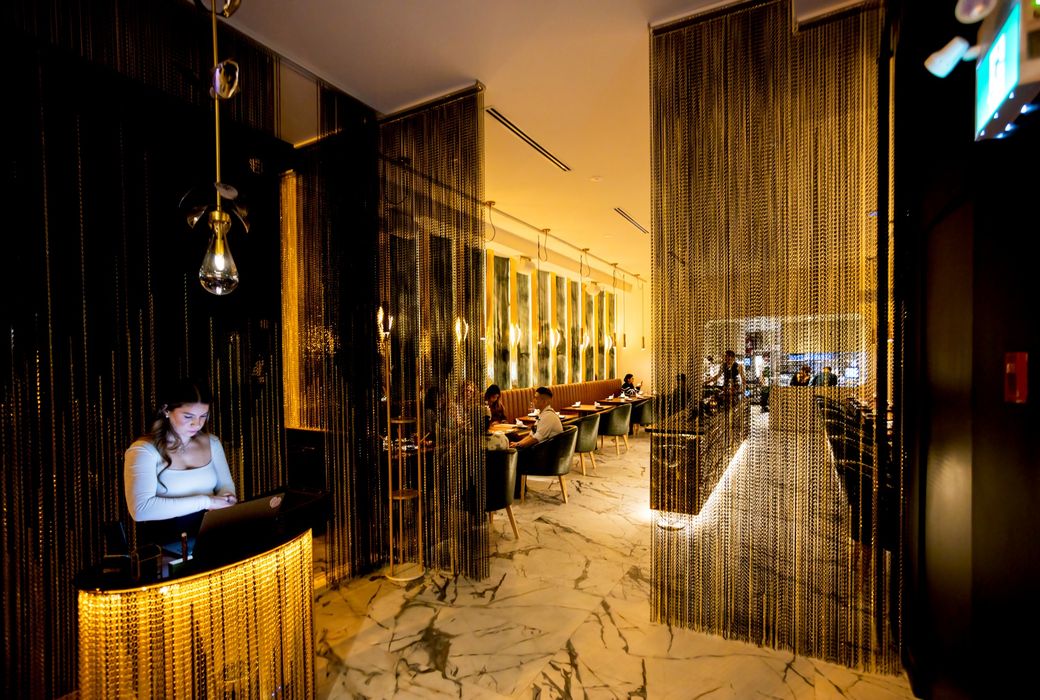Like this Place?
Casa Paco is a charming restaurant serving Spanish- and Italian-influenced cuisine with crafted zero-proof cocktails in Little Italy.
Billing itself as a family restaurant, the operation is run by its four founders: chef Rob Bragagnolo and wife Caroline Chinery who helm the kitchen, with Tommy Conrad at the bar and Ailbhe McMahon running the front of the house.
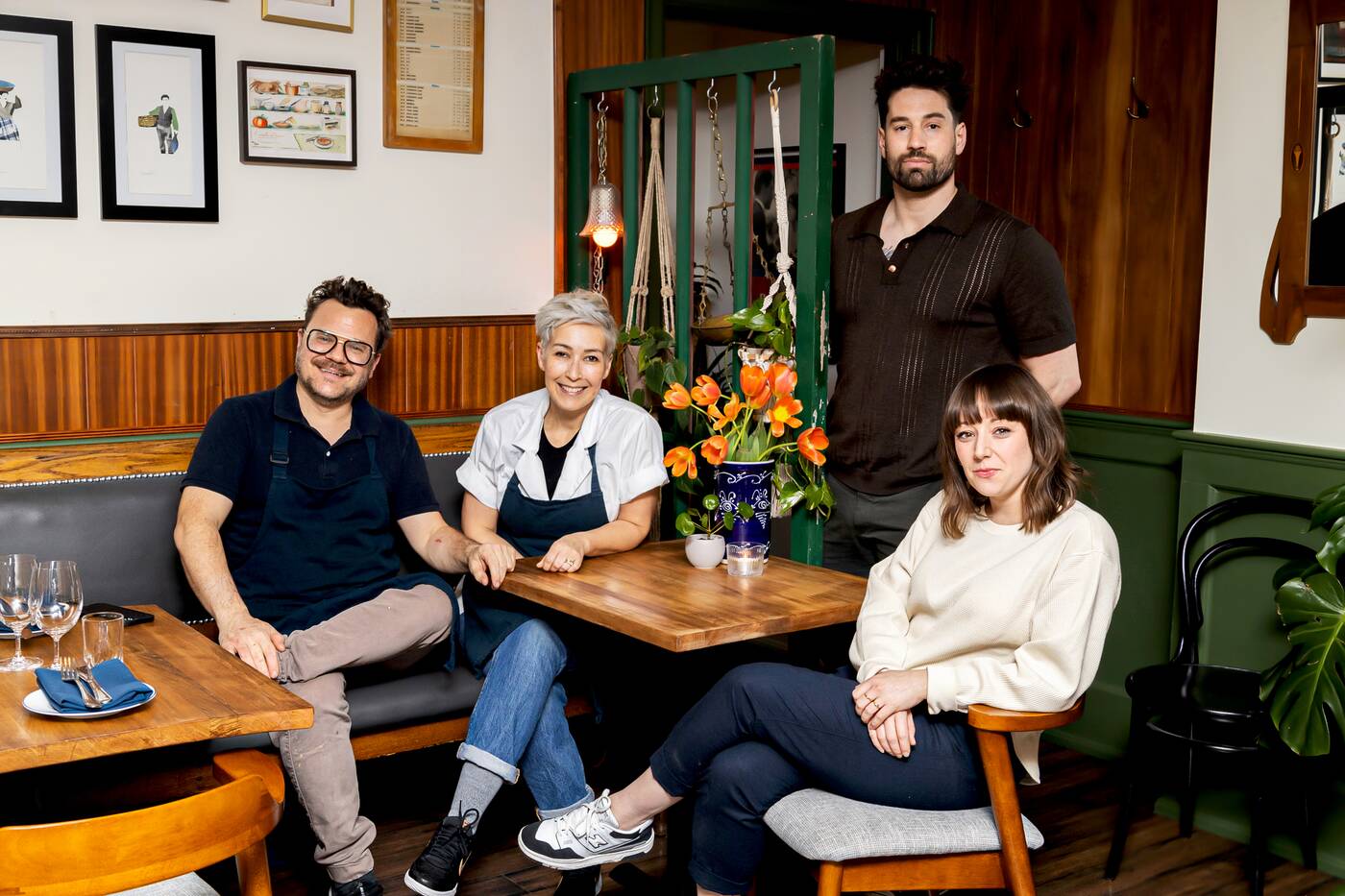
Chef Rob Bragagnolo and Caroline Chinery (seated on the left) with Tommy Conrad (standing) and Ailbhe McMahon (seated on the right).
The quartet met and worked together at Labora, the refined Spanish restaurant at King and Spadina that Bragagnolo and Chinery opened and rebranded from Campo Food Hall.
(Bragagnolo also owned and operated Carver, which was known for its excellent porchetta sandwiches, and prior to that, was the executive chef at recently shuttered farm-to-table restaurant, Marben.)
"The idea behind Casa Paco is that it is a love letter to the rich traditions of old-world trattorias, tabernas, and bistros," Bragagnolo tells blogTO. "[These are] venues that envelope guests with warm hospitality, regional fare, and timeless elegance. A neighbourhood spot that makes you feel like you've always been going there and that it's always been there.
"We believe in the classics, done with finesse while elevating to excellence the simplest of ingredients. We think the humble countryside cuisines of Italy, Spain, and France are an irresistible combination of being honest, generous, and refined."
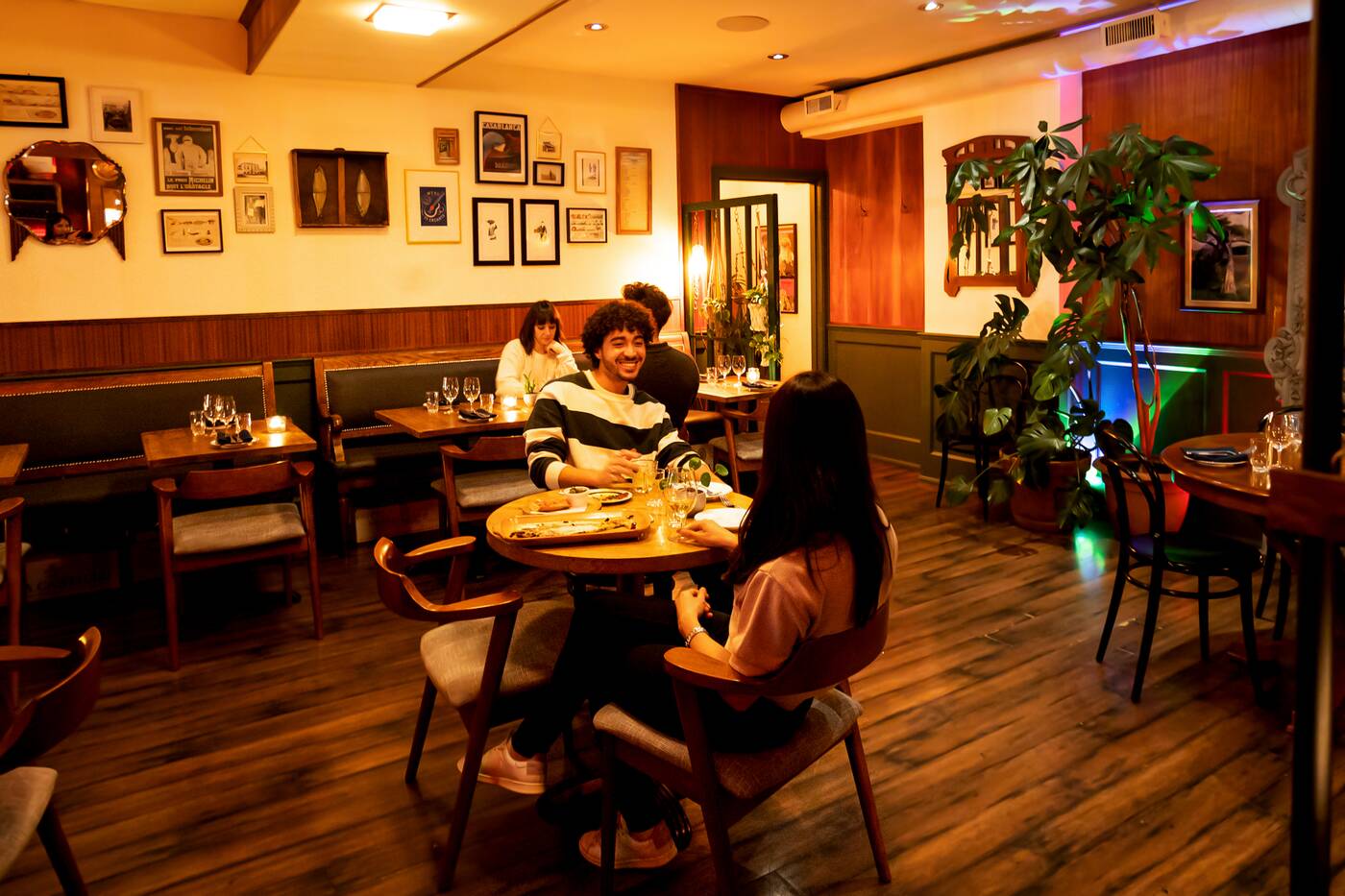 Here, on Clinton Street, the team has transformed Boonsik's stark space into a warm bistro-like setting lined with reupholstered 150-year-old church pews, decorative framed mirrors, greenery and framed vintage gastronomic prints and family photos.
Here, on Clinton Street, the team has transformed Boonsik's stark space into a warm bistro-like setting lined with reupholstered 150-year-old church pews, decorative framed mirrors, greenery and framed vintage gastronomic prints and family photos.
The inviting long dining room is split into two distinct areas: a cozy dining room that's perfect for a date night or convivial dinner with a small group of friends or family; and a darker bar with standing tables for drinks and light bites.
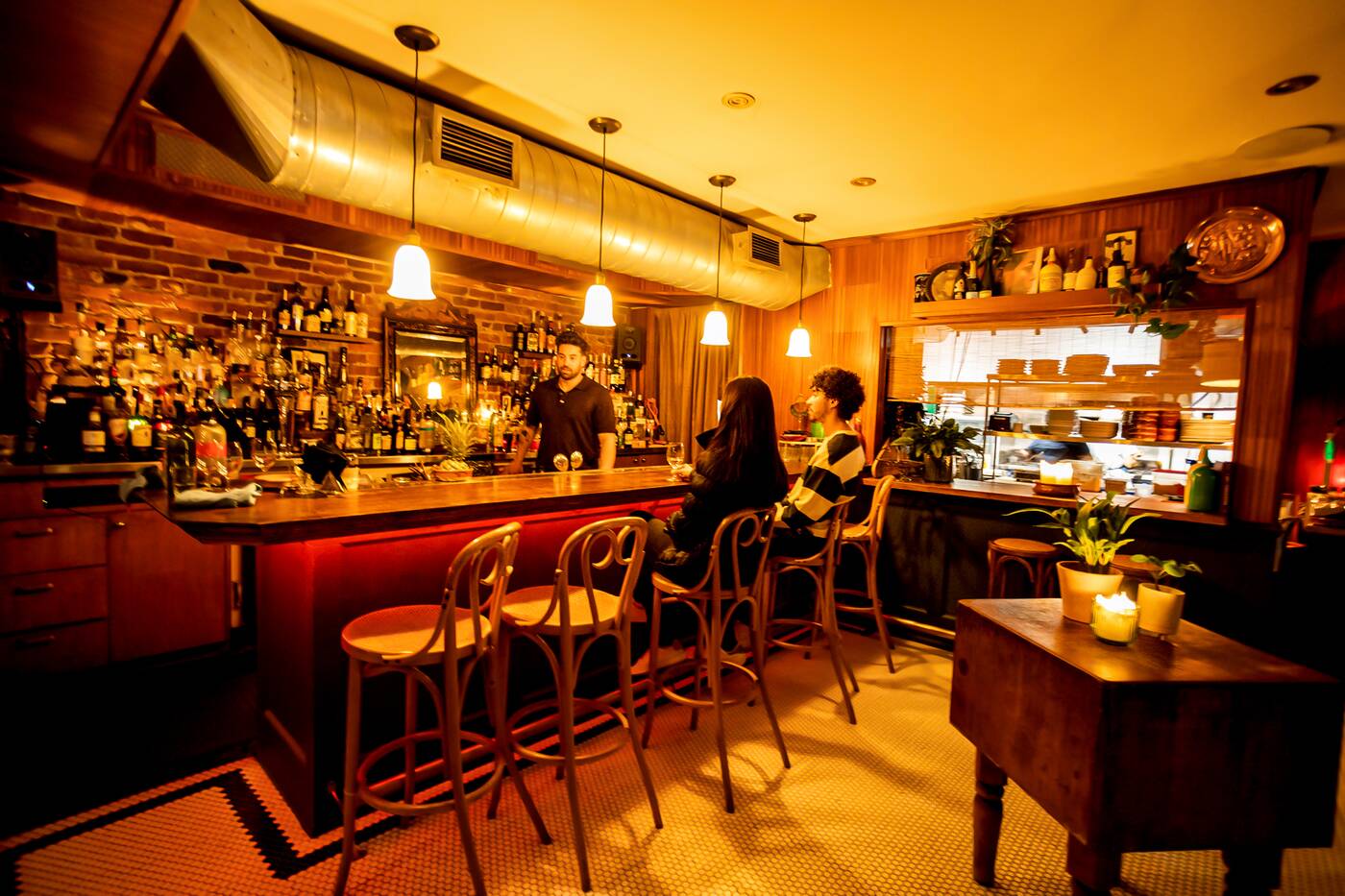 Since the entire operation is managed only by the group of four, McMahon shares that the dining room will never seat more than 30, despite being licensed for more. The bar is walk-ins only.
Since the entire operation is managed only by the group of four, McMahon shares that the dining room will never seat more than 30, despite being licensed for more. The bar is walk-ins only.
"That seems to be our magic number in a way that service feels in control and intimate," McMahon tells blogTO, adding that in warmer months, the restaurant's patio will only accommodate 24.
When it comes to the food, Bragagnolo taps into his Italian roots and training in Iberian cuisine. Cooking with restraint, he keeps things simple by letting the ingredients shine on the seasonally inspired menu that changes daily (note: the restaurant is only open from Thursdays to Sundays).
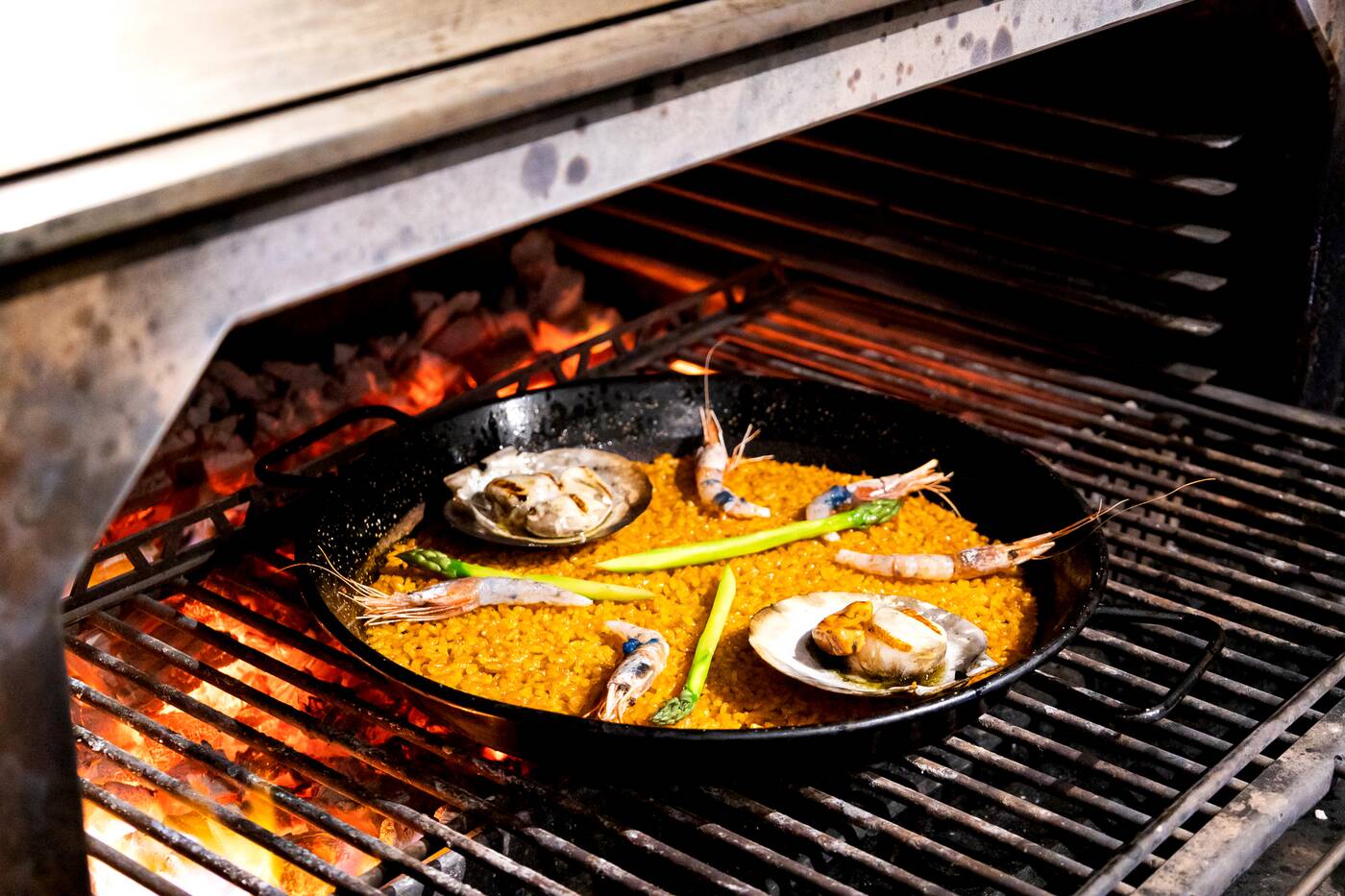 A highlight in the kitchen, besides Bragagnolo's execution of his craft, is the charcoal oven imported from Spain that he uses for wood-fired cooking.
A highlight in the kitchen, besides Bragagnolo's execution of his craft, is the charcoal oven imported from Spain that he uses for wood-fired cooking.
The daily a la carte options feature an assortment of pintxos followed by slightly more substantial share plates that range from dishes like a lightly smoked Mimosa Springs trout crudo ($20) to lemon dressing tossed zucchini green salad with feta and walnuts ($26).
There are mains like the 24 oz Ontario rib steak ($90) from Penokean Hills Farms that's served with red pepper emulsion or a wood-fired octopus ($32).
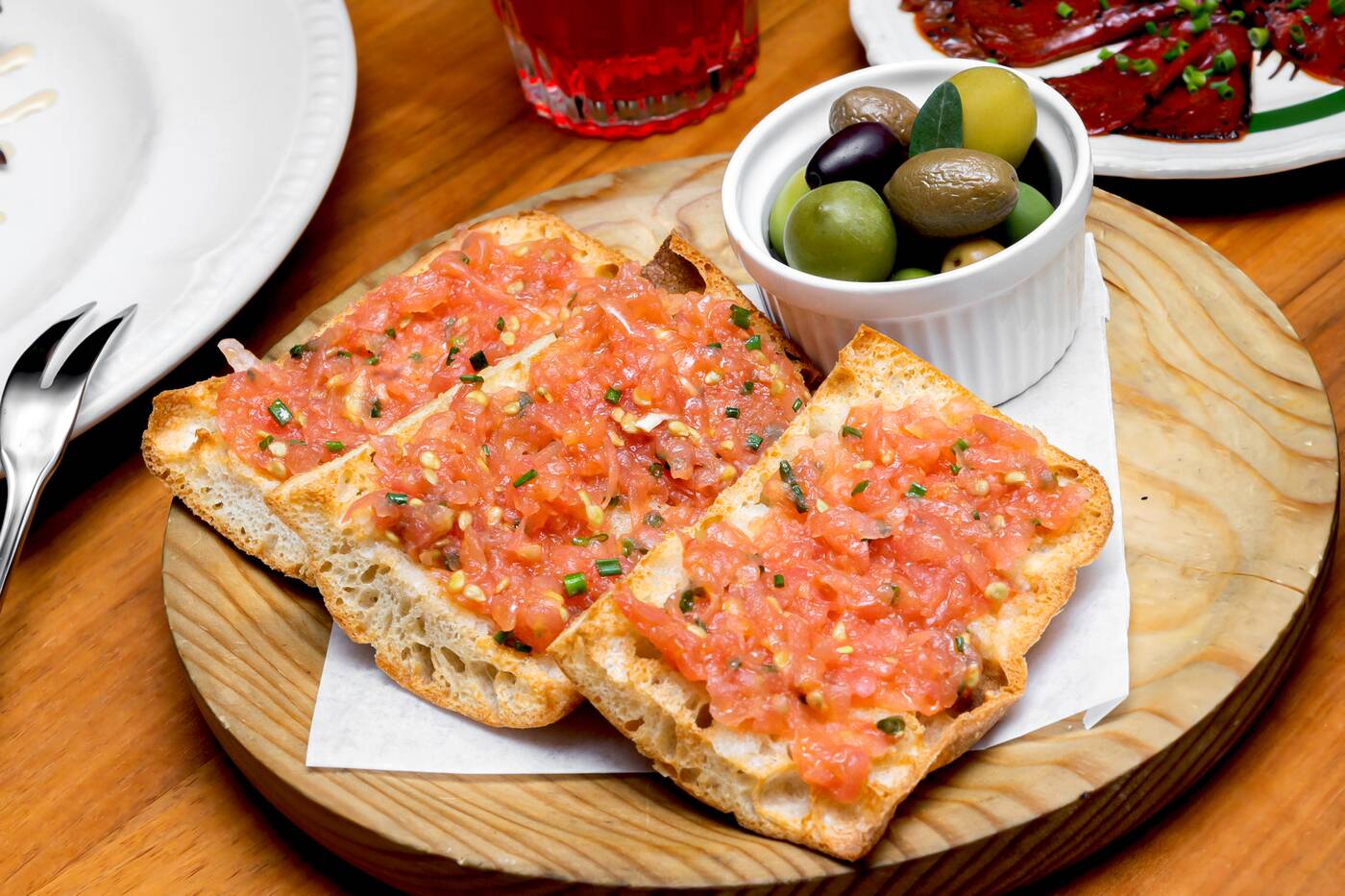 A staple at practically every dining establishment in Spain, the version of Tomato Bread & Olives ($12) here features crystal bread, a rustic holey bread found in Catalonia, made using a high-hydration dough Bragagnolo perfected in his Labora days.
A staple at practically every dining establishment in Spain, the version of Tomato Bread & Olives ($12) here features crystal bread, a rustic holey bread found in Catalonia, made using a high-hydration dough Bragagnolo perfected in his Labora days.
The result is airy light with a crunchy crust that's kissed by garlic, a layer of tomato pulp and a drizzle of olive oil. The pan con tomate is served with Spanish olives that have been marinated in orange and rosemary.
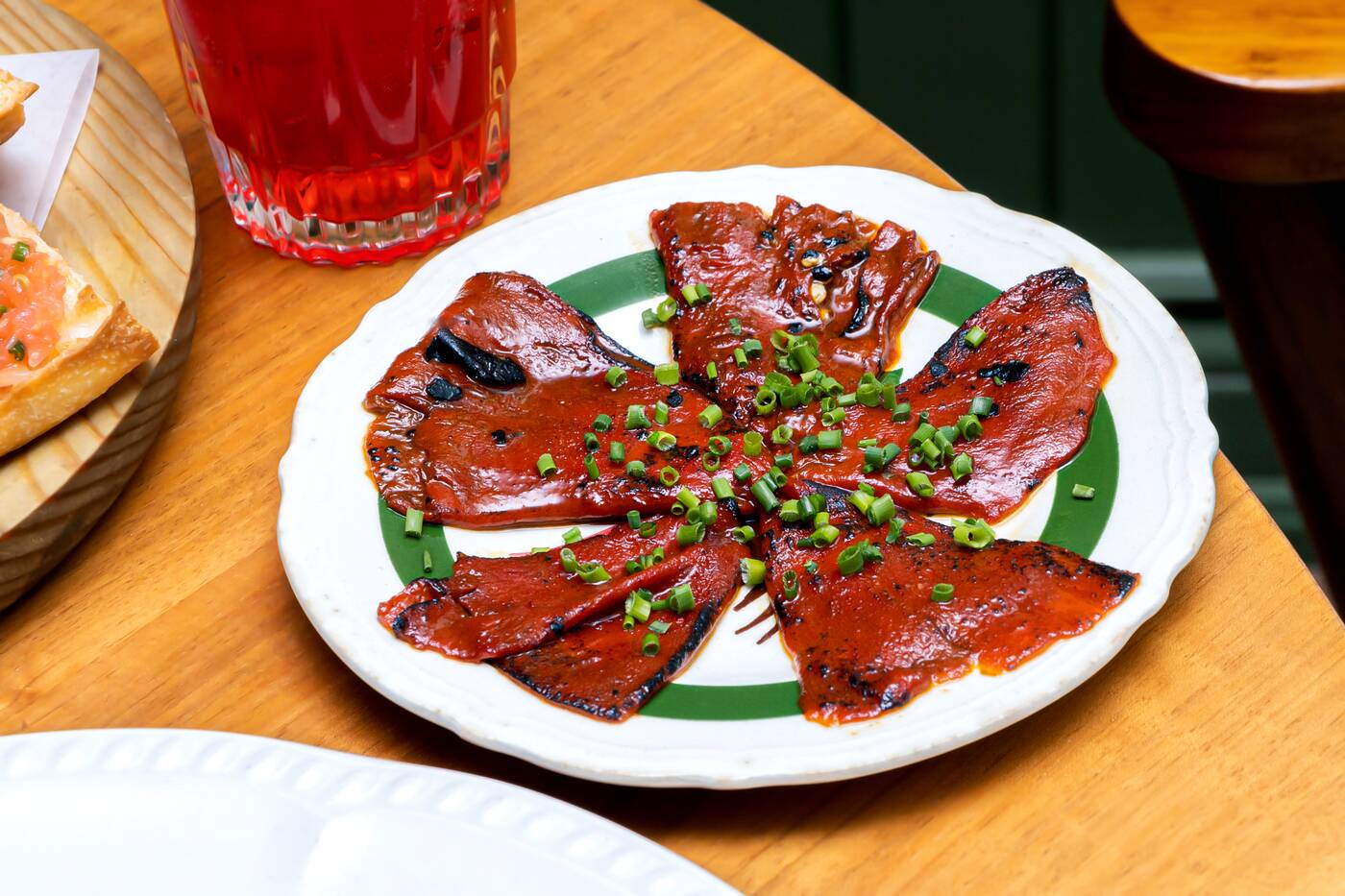 To elevate the bread service, you can choose from several add-ons such as the fire-roasted Piquillo Peppers ($10) which are silky sweet, meaty-thick and lush like velvety ribbons.
To elevate the bread service, you can choose from several add-ons such as the fire-roasted Piquillo Peppers ($10) which are silky sweet, meaty-thick and lush like velvety ribbons.
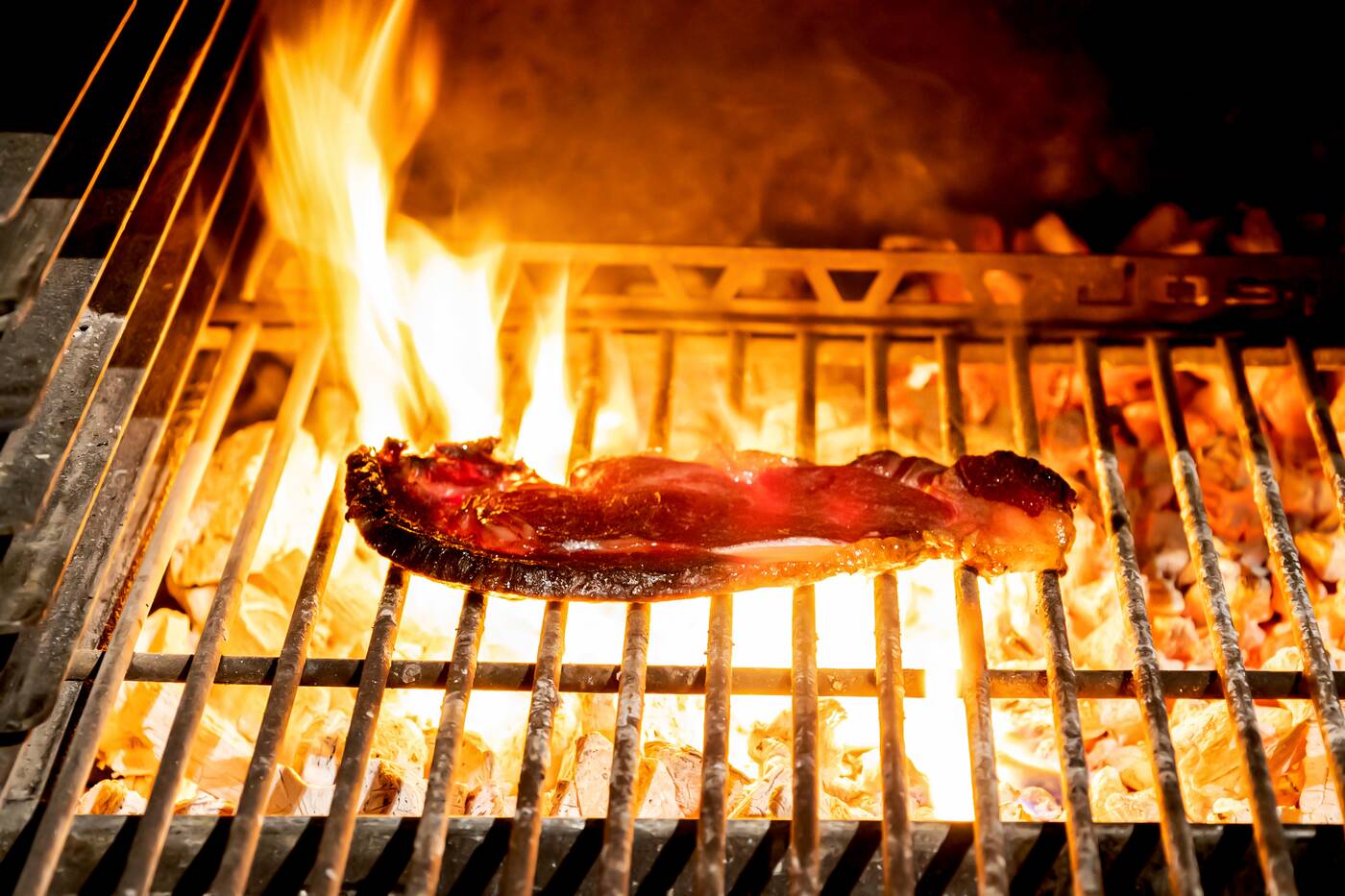 The cheeky named Steak, Tartare ($32) takes a thin slice of rib steak that's cooked on one side (the steak bit) with the other left raw (the tartare side).
The cheeky named Steak, Tartare ($32) takes a thin slice of rib steak that's cooked on one side (the steak bit) with the other left raw (the tartare side).
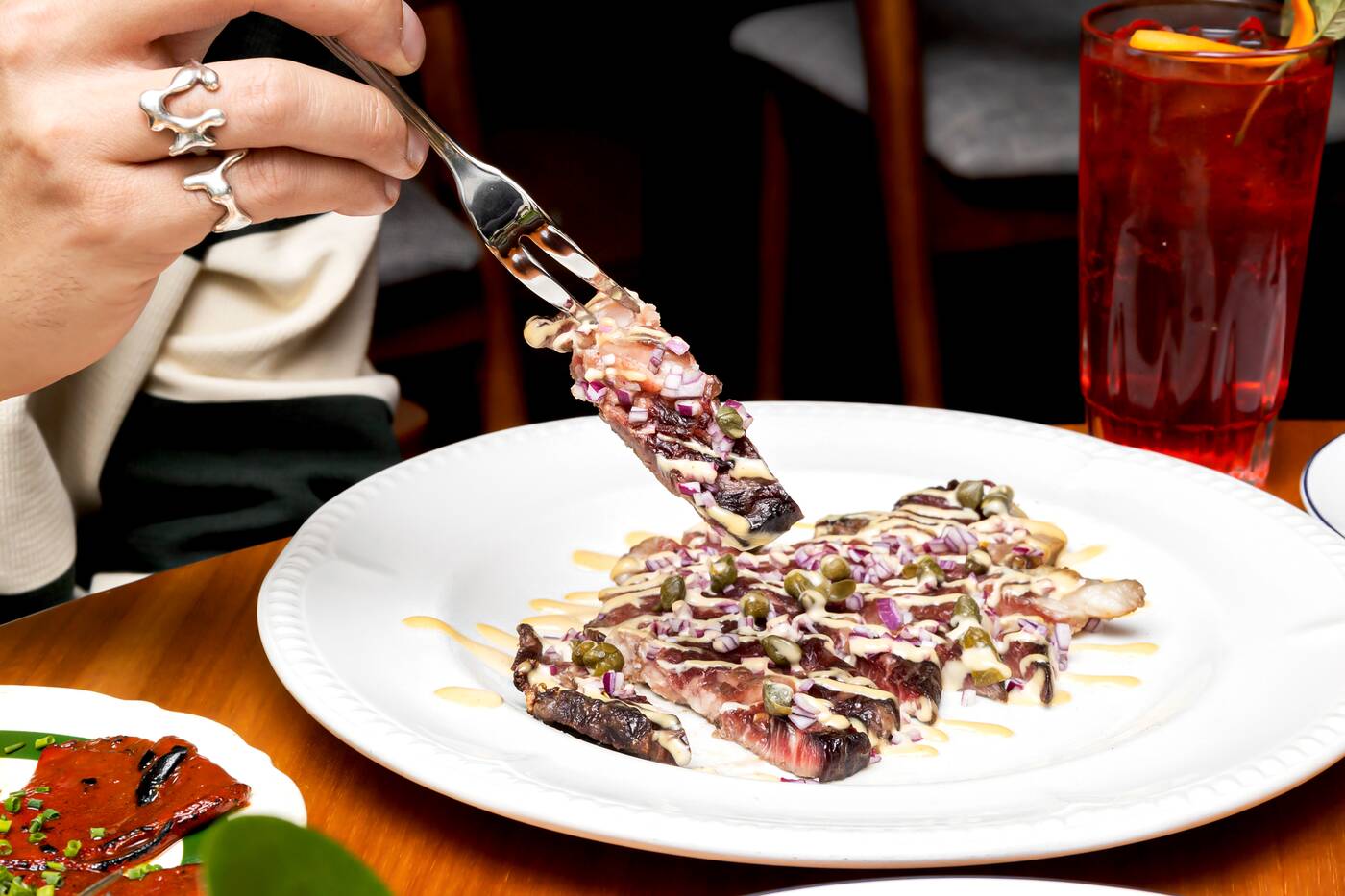 The method allows for more of the meat's inherent flavours to shine even though the beef is already dry aged - a step that makes the meat more tender and results in robust flavour. Cooking one side of the steak doesn't only heat up the fat which has plenty of flavour too, but it also gives the dish a bit more texture (in contrast to straight chopped lean tenderloin).
The method allows for more of the meat's inherent flavours to shine even though the beef is already dry aged - a step that makes the meat more tender and results in robust flavour. Cooking one side of the steak doesn't only heat up the fat which has plenty of flavour too, but it also gives the dish a bit more texture (in contrast to straight chopped lean tenderloin).
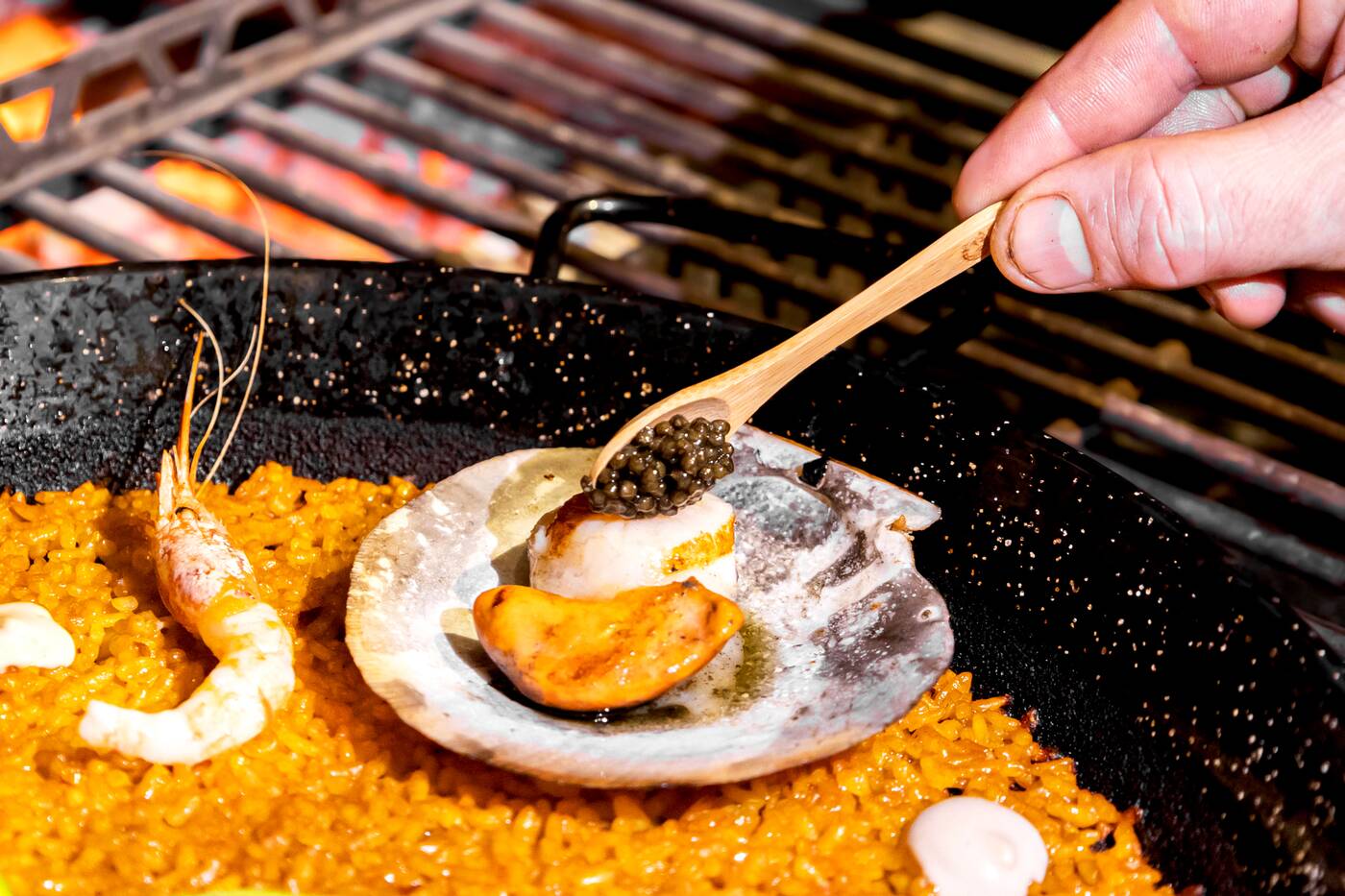 Paella lovers should mark off Sundays as the day to visit the crew. Besides a shortened a la carte menu that features a weekly changing "fancy" paella – on our visit, it was one topped with lobster, runner beans and saffron aioli for ($45), the restaurant offers a well-priced Paella Sunday menu.
Paella lovers should mark off Sundays as the day to visit the crew. Besides a shortened a la carte menu that features a weekly changing "fancy" paella – on our visit, it was one topped with lobster, runner beans and saffron aioli for ($45), the restaurant offers a well-priced Paella Sunday menu.
For $45 per person, a minimum of two to participate, the prix fixe menu comes with three starters that might include tomato bread, grilled artichokes and a charred rapini and kale dish, along with a choice of seafood, beef short rib or a seasonal mushroom and truffle paella.
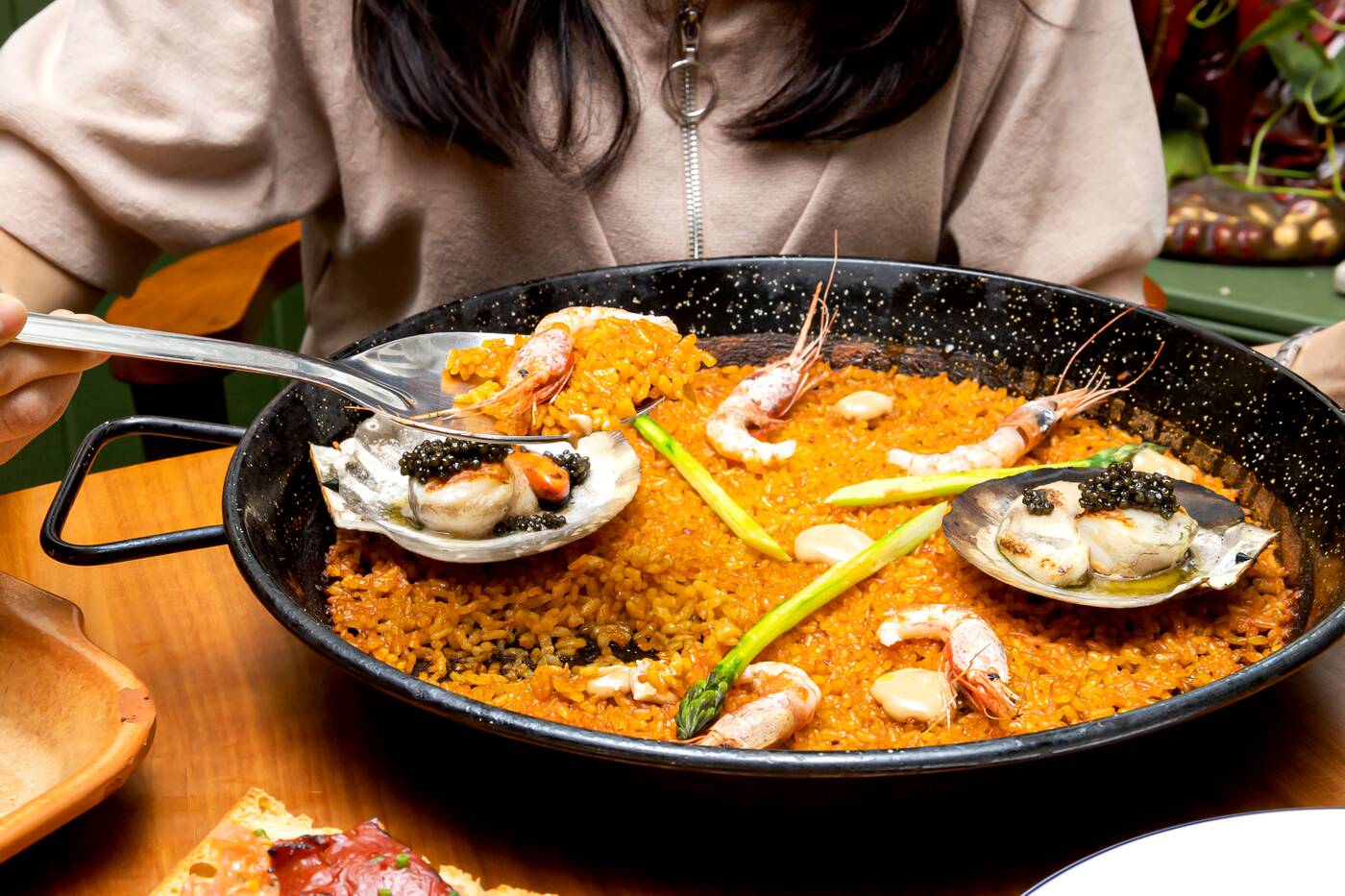 The "fancy" Seafood Paella (market price) on our visit was topped with blue belly shrimps and freshly shucked Mahone Bay scallops which are served with its roe and christened with caviar.
The "fancy" Seafood Paella (market price) on our visit was topped with blue belly shrimps and freshly shucked Mahone Bay scallops which are served with its roe and christened with caviar.
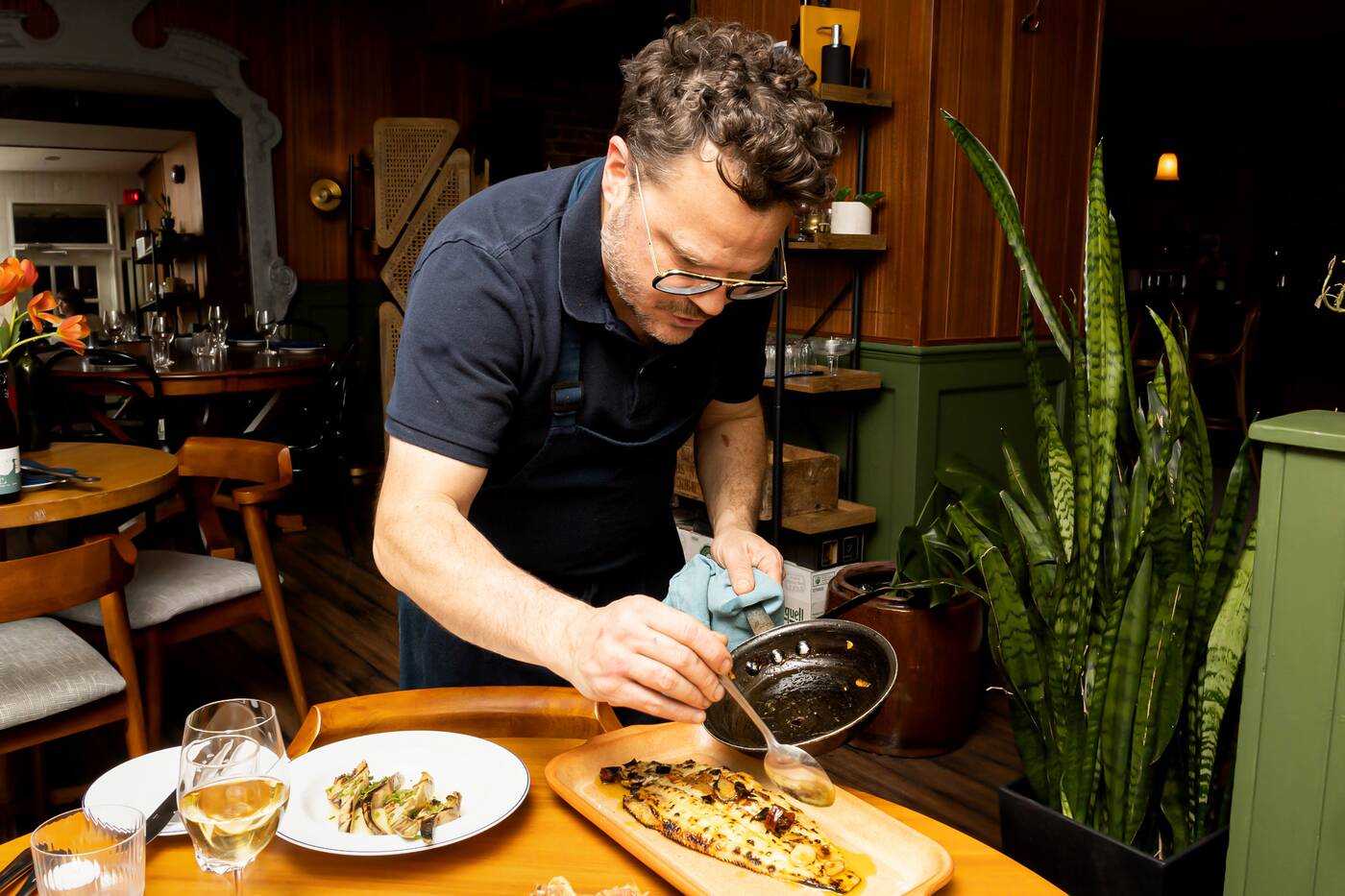 Casa Paco's changing fish selection might feature a Charcoal Grilled Whole Dover Sole ($75).
Casa Paco's changing fish selection might feature a Charcoal Grilled Whole Dover Sole ($75).
Although spendy, every lush morsel of the tender and silky flesh is enhanced by the aromatic and savoury pil-pil sauce it's based with.
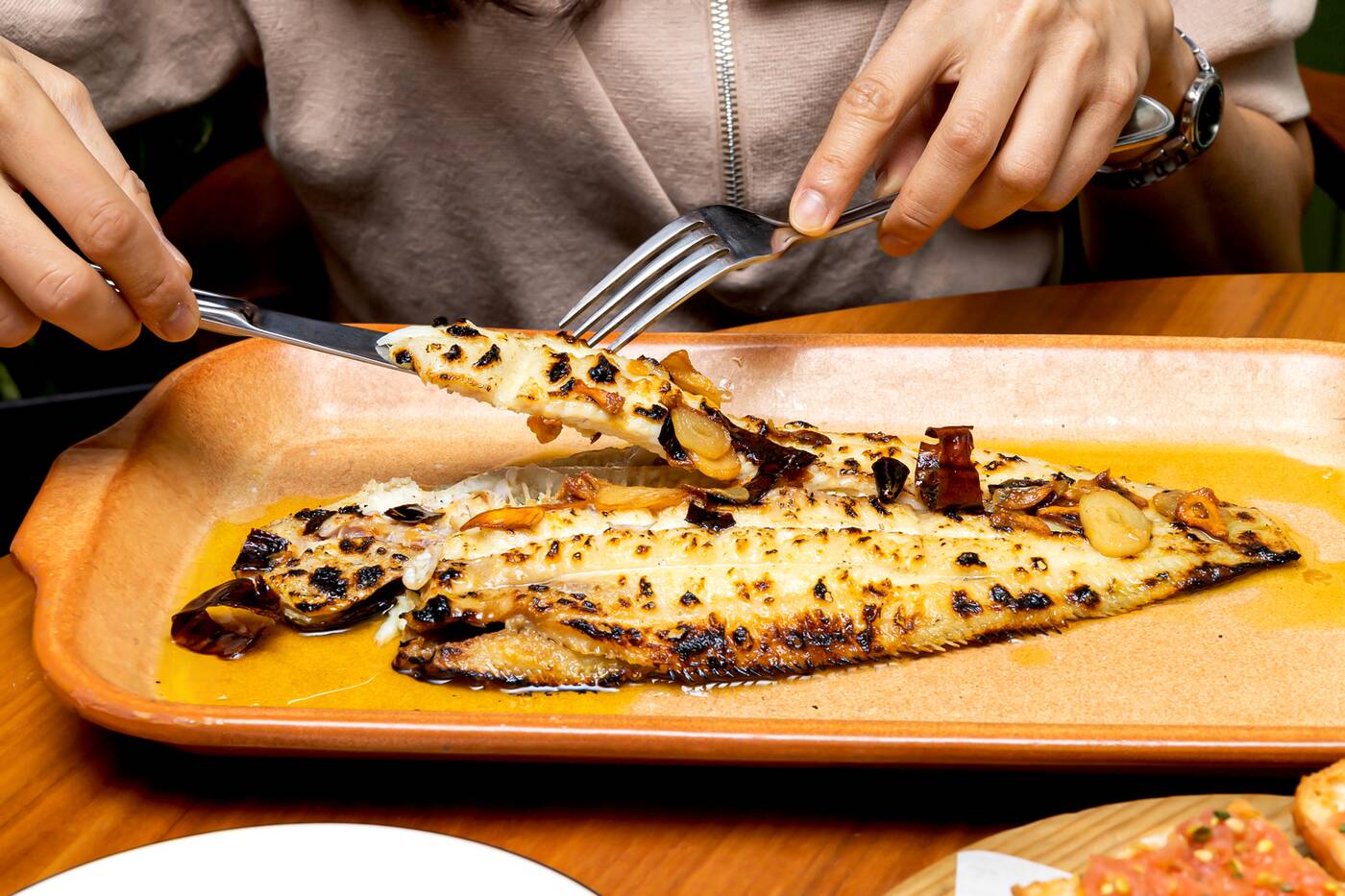 The latter, an emulsion made from the garlic-infused oil that's whisked with the fish's milky white protein juices, is infused with dried Spanish chili peppers.
The latter, an emulsion made from the garlic-infused oil that's whisked with the fish's milky white protein juices, is infused with dried Spanish chili peppers.
It's clean, sweet, gorgeous, and a table favourite.
Paired with Casa Paco's food, McMahon has curated a tight selection of predominantly Old-World wines from Europe, with many by-the-glass options that tap into regions that aren't as widely showcased in the city including those from the Basque Country, and a number of low intervention – natural, if you must – wines.
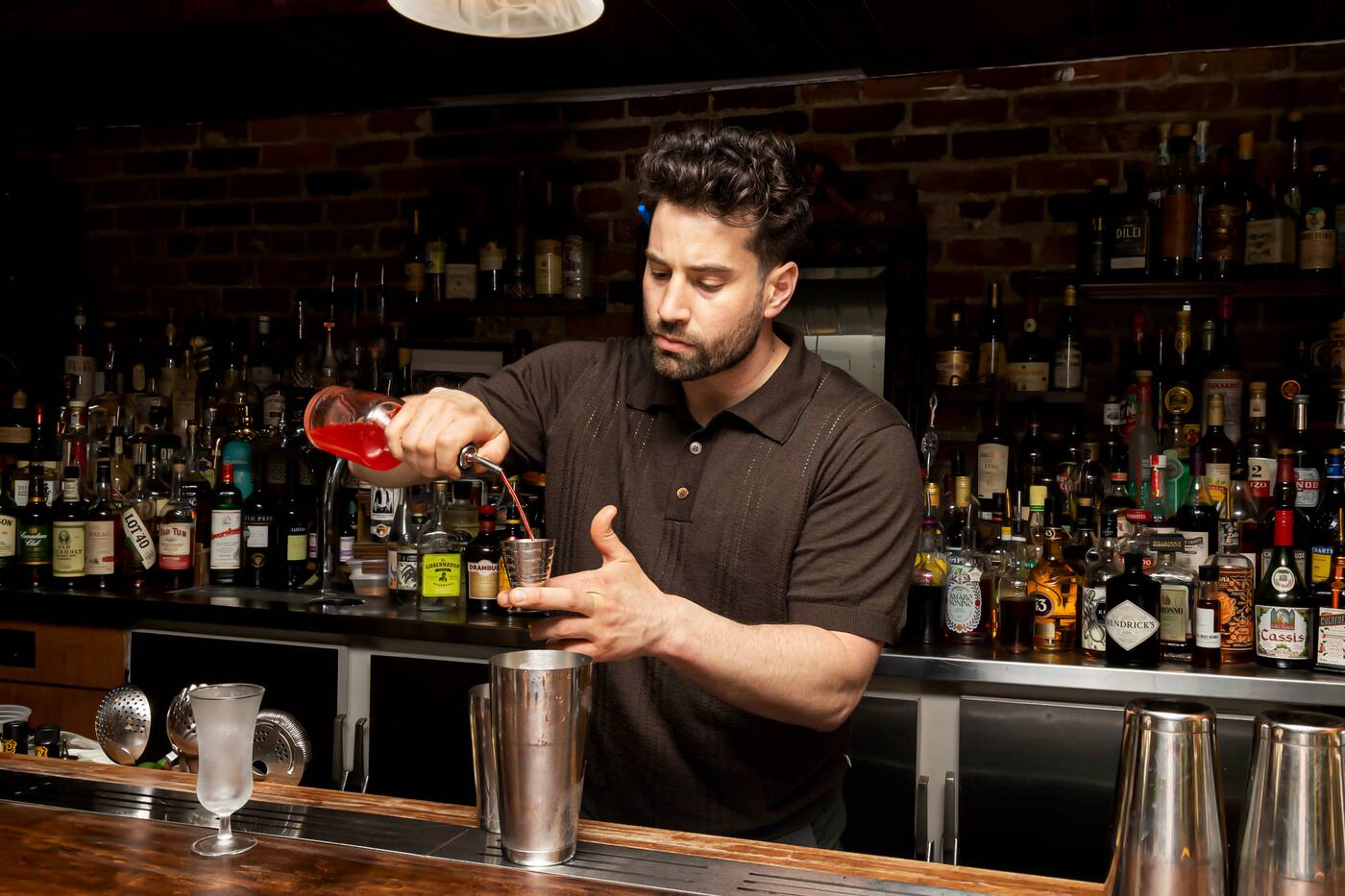 When it comes to spirits, Casa Paco has a back bar that's filled with everything needed to create Conrad's extensive list of cocktails, as well as Amaros. Conrad is also able to craft bespoke cocktails on the spot.
When it comes to spirits, Casa Paco has a back bar that's filled with everything needed to create Conrad's extensive list of cocktails, as well as Amaros. Conrad is also able to craft bespoke cocktails on the spot.
While I do enjoy my booze, I'm deeply impressed by the restaurant's strong – and growing – list of low- or zero-proof cocktails.
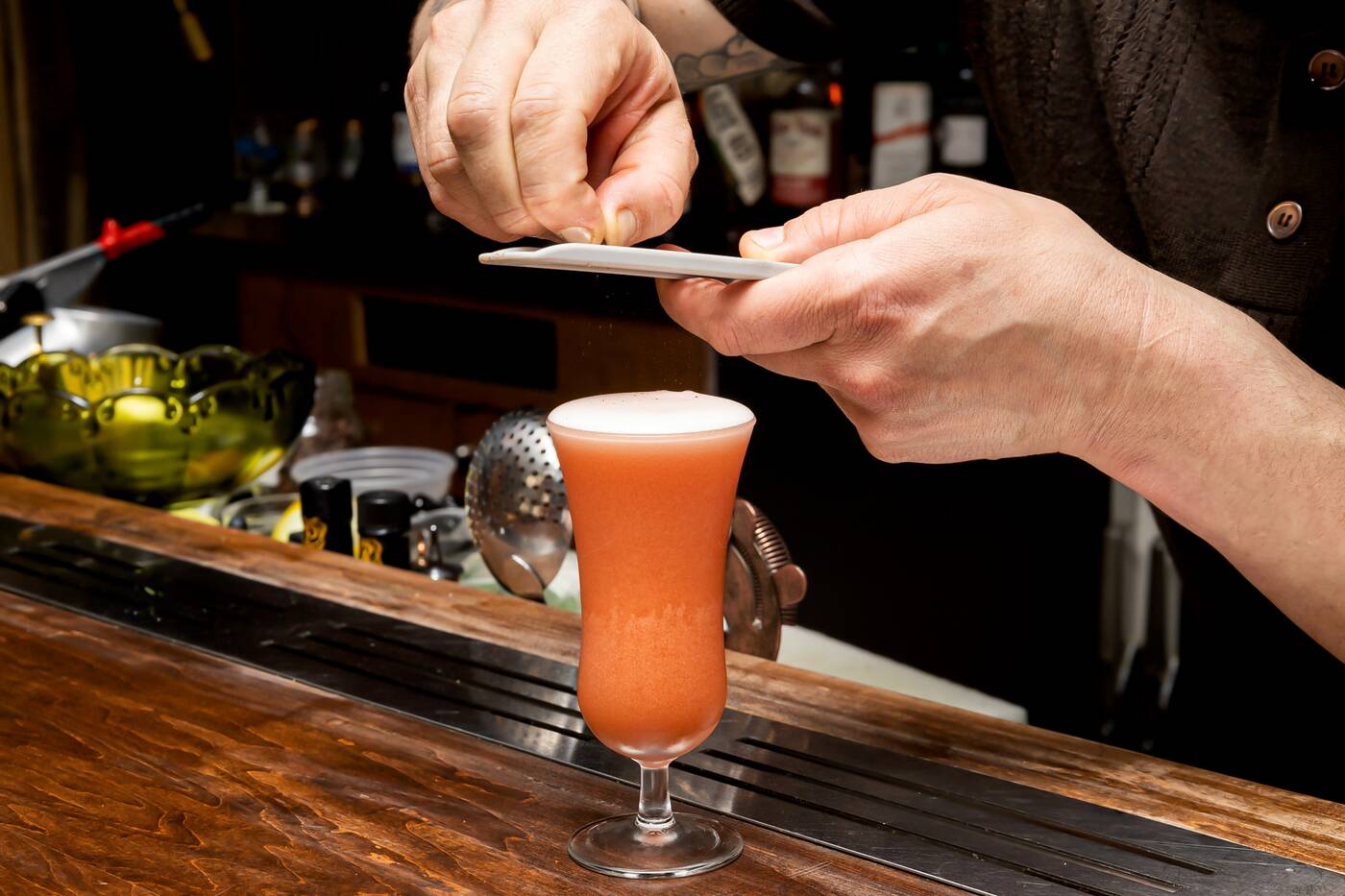 Full of flavour, they employ homemade syrups, tinctures, and infusions that Conrad shares are mostly made through sous vide preparations with herbs, spices, fruit, and random ingredients like popcorn that can mimic the flavours found in spirits like bourbon.
Full of flavour, they employ homemade syrups, tinctures, and infusions that Conrad shares are mostly made through sous vide preparations with herbs, spices, fruit, and random ingredients like popcorn that can mimic the flavours found in spirits like bourbon.
"I think a lot more people are sober curious," says McMahon. "And with health guidelines, and how a lot of people drive to restaurants, it's becoming more popular because there are more sophisticated drink options. Tommy is hitting many of the flavours that are so close that it's hard to tell the difference that there's no alcohol in them."
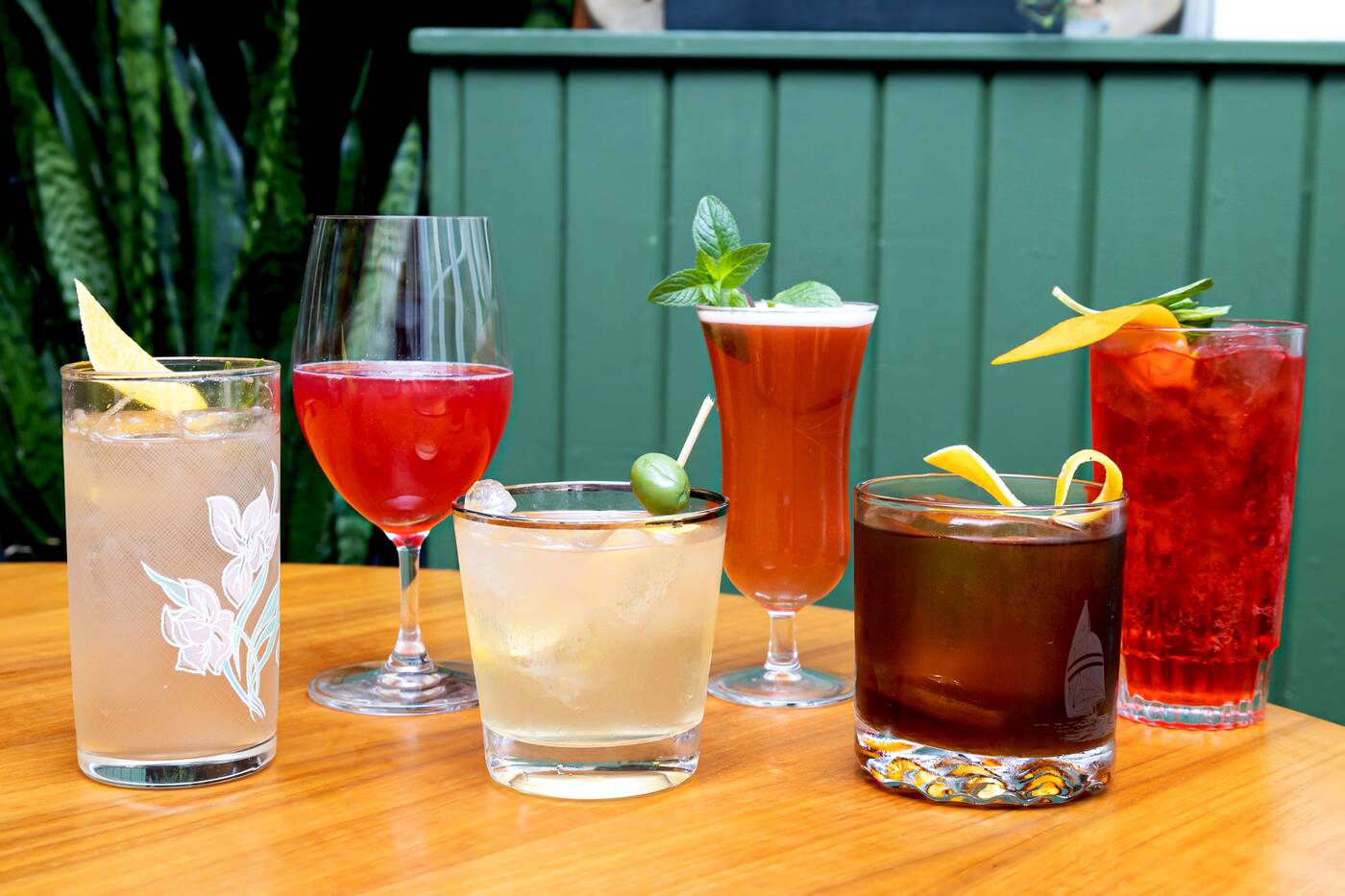 Other options include the Sage & Soda ($7) that contains sage, herbs, pepper, and grapefruit, while the Vin Suave ($12) is made with fermented fruits and is Conrad's natural wine substitute.
Other options include the Sage & Soda ($7) that contains sage, herbs, pepper, and grapefruit, while the Vin Suave ($12) is made with fermented fruits and is Conrad's natural wine substitute.
There's a spin on the vermouth and soda, called the 50/50 ($11), and is composed of Casa 00 Bianco, citrus, herbs, and soda water. Meanwhile, for a Negroni-eque, look to The General ($12), a dark number that uses Casa 00 Amaro, grapefruit and a homemade elderflower extract.
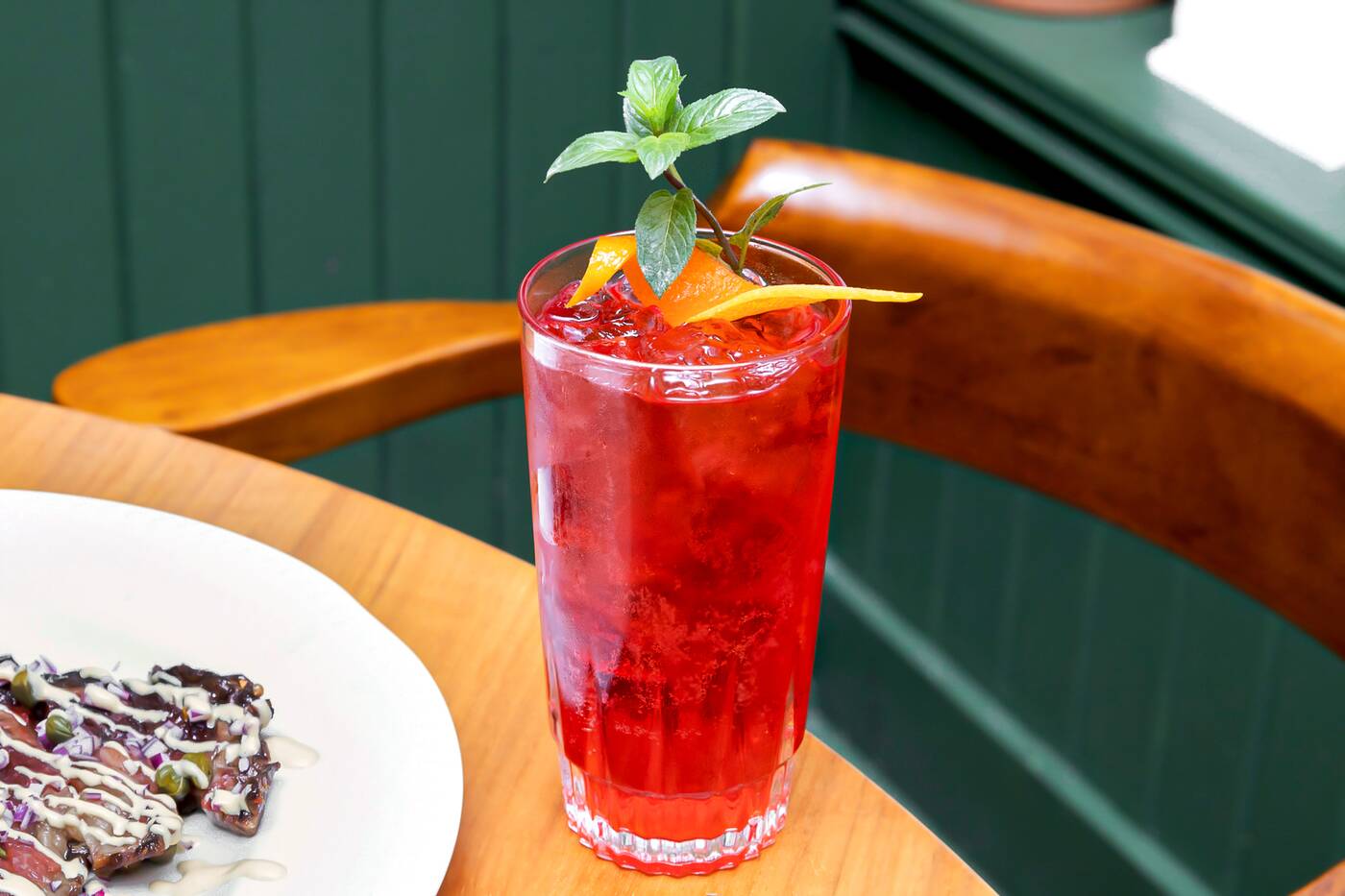 Aperol Spritz-ish The Rossa ($12) uses non-alcoholic house aperitivo with orange, rosemary, and soda water.
Aperol Spritz-ish The Rossa ($12) uses non-alcoholic house aperitivo with orange, rosemary, and soda water.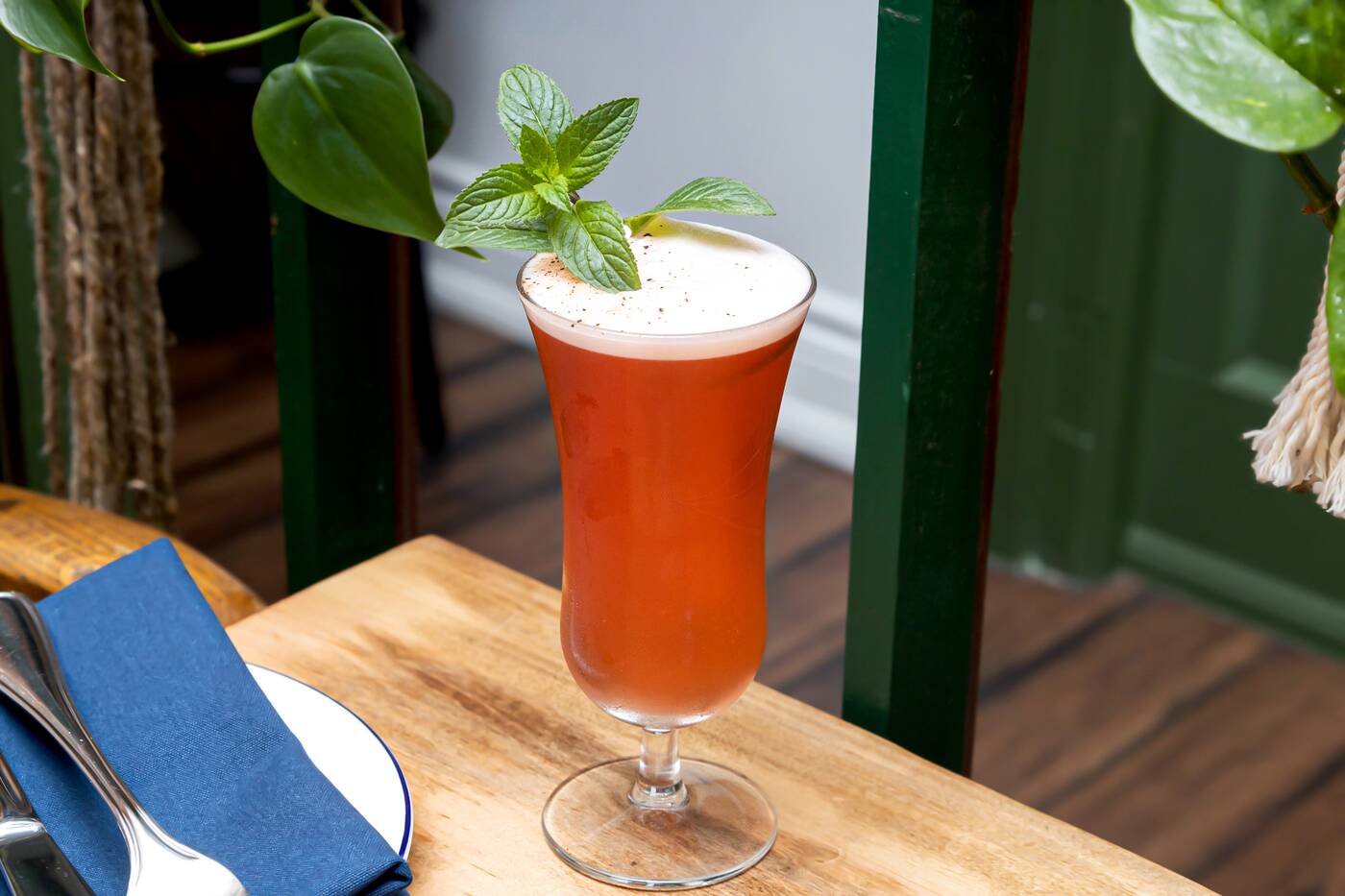 There's also the Crimson Tide ($14) which employs Casa 00 Bourbon, grapefruit, lime, and egg white.
There's also the Crimson Tide ($14) which employs Casa 00 Bourbon, grapefruit, lime, and egg white.
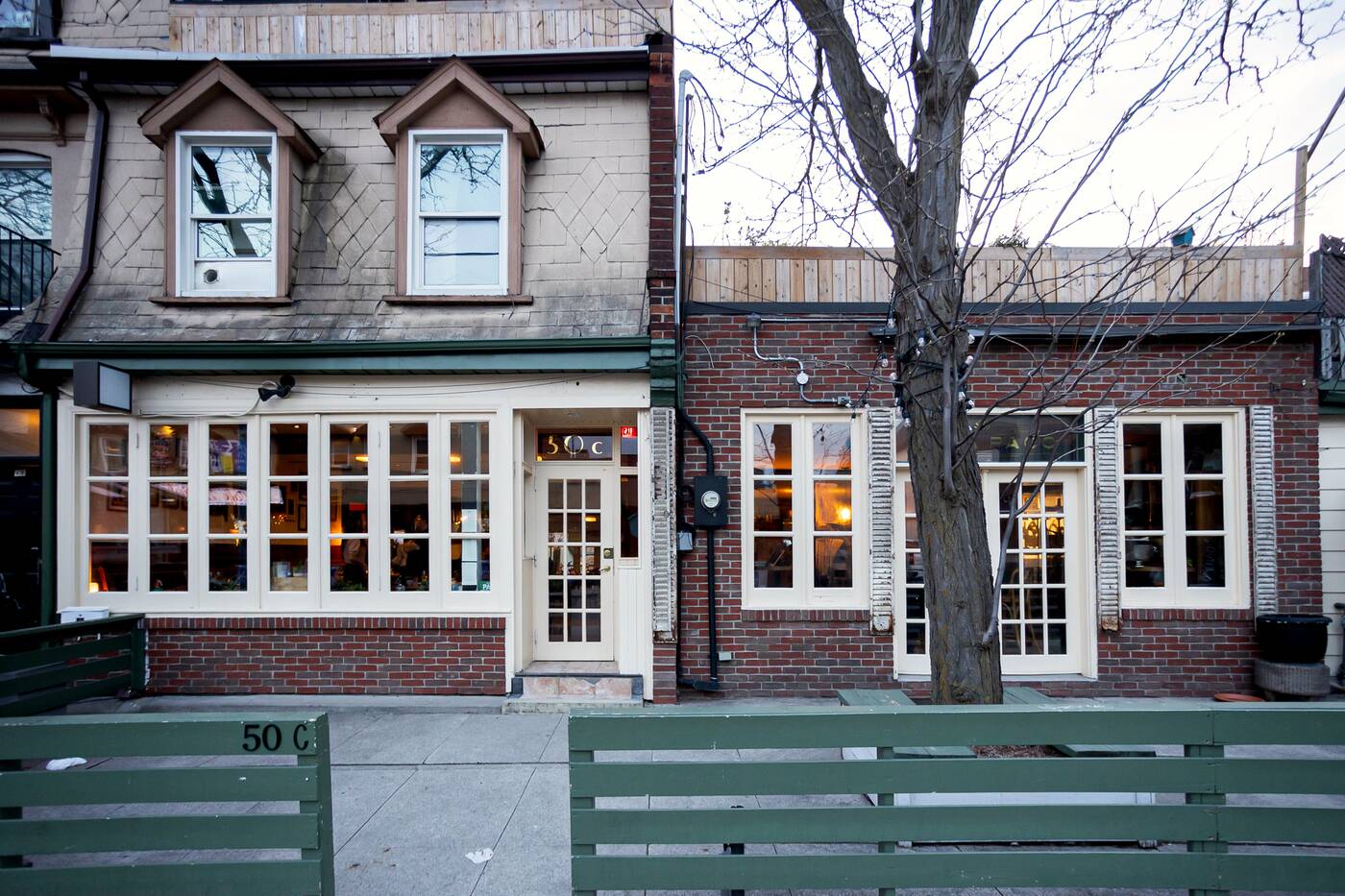 Casa Paco is located at 50C Clinton Street, just north of College Street.
Casa Paco is located at 50C Clinton Street, just north of College Street.
Fareen Karim
Latest Videos








